Note: Yale School of the Environment (YSE) was formerly known as the Yale School of Forestry & Environmental Studies (F&ES). News articles and events posted prior to July 1, 2020 refer to the School's name at that time.
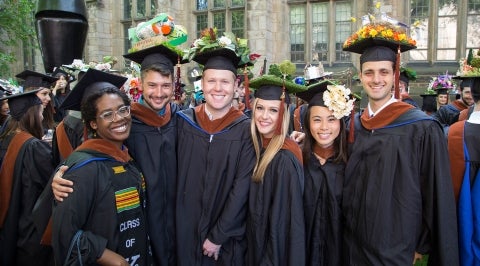
Indy Burke began her role as Dean of the Yale School of Forestry & Environmental Studies (F&ES) in the fall of 2016, just a few months after the Class of 2018 master’s students first arrived on campus. And much has happened in the 19 months since, as Burke reminded these same students — now graduates — during the School’s 117th commencement ceremony on May 21.
Even as the planet continued to warm, she said, the U.S. government stepped away from the Paris climate accords and made repeated steps to roll back environmental protections. Ethnic cleansing continues in parts of the world, and racism continues to persist in institutions across the country, in the implementation of conservation, and remains embedded in the history of F&ES.
Even as the planet continued to warm, she said, the U.S. government stepped away from the Paris climate accords and made repeated steps to roll back environmental protections. Ethnic cleansing continues in parts of the world, and racism continues to persist in institutions across the country, in the implementation of conservation, and remains embedded in the history of F&ES.
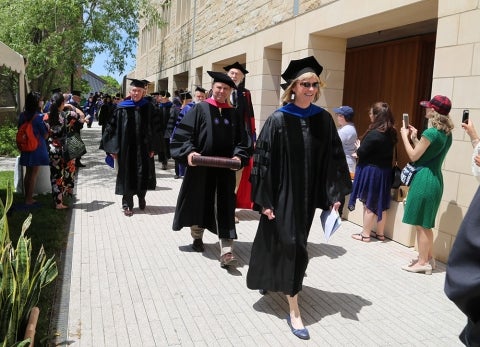 F&ES Dean Indy Burke leads a procession of faculty and graduates into the Kroon courtyard.
F&ES Dean Indy Burke leads a procession of faculty and graduates into the Kroon courtyard.
There’s much to be outraged about, Burke said. She encouraged the graduating class to remain outraged and passionate about what’s happening in the world. But at the same time, she cautioned students to be strategic about their outrage, because it consumes a lot of energy.
She urged them to find humility in moments of anger, to recognize that their perspectives might not always be correct, to show respect to those with whom they disagree, and to nurture discussion rather than engaging in revenge.
“It is a time of outrage and is a time when the world needs your leadership,” she said. “It needs your leadership, your scholarship, and your continuing discretion about where to aim your outrage.
“We put our faith in you. You are among the most brilliant, passionate, strategic and energetic individuals I have ever known. You will be leaders, as are our other 4,900 alumni all over the world — making a difference in NGOs, state and national and international agencies, and universities, and companies, and local communities. Today we launch you upon the world, another 156 environmental leaders and scholars to move the world forward.”
Watch the ceremony | View photos
The School’s 117th graduating class, which received their diplomas under a tent on the sun-splashed Kroon courtyard, included 12 Ph.D. recipients, who will now tackle a wide range of environmental challenges, from installing solar plants on U.S. public lands and verifying the legality of forest product markets, to improving salt marsh ecosystem function and evaluating the link between air pollution and birth outcomes.
Also receiving diplomas were 156 master’s students. Among those were 34 joint-degree students, including the first group of students to receive a combination of Master of Environmental Management and Master of Science in Environmental Engineering from Tsinghua University in China.
She urged them to find humility in moments of anger, to recognize that their perspectives might not always be correct, to show respect to those with whom they disagree, and to nurture discussion rather than engaging in revenge.
“It is a time of outrage and is a time when the world needs your leadership,” she said. “It needs your leadership, your scholarship, and your continuing discretion about where to aim your outrage.
“We put our faith in you. You are among the most brilliant, passionate, strategic and energetic individuals I have ever known. You will be leaders, as are our other 4,900 alumni all over the world — making a difference in NGOs, state and national and international agencies, and universities, and companies, and local communities. Today we launch you upon the world, another 156 environmental leaders and scholars to move the world forward.”
Watch the ceremony | View photos
The School’s 117th graduating class, which received their diplomas under a tent on the sun-splashed Kroon courtyard, included 12 Ph.D. recipients, who will now tackle a wide range of environmental challenges, from installing solar plants on U.S. public lands and verifying the legality of forest product markets, to improving salt marsh ecosystem function and evaluating the link between air pollution and birth outcomes.
Also receiving diplomas were 156 master’s students. Among those were 34 joint-degree students, including the first group of students to receive a combination of Master of Environmental Management and Master of Science in Environmental Engineering from Tsinghua University in China.
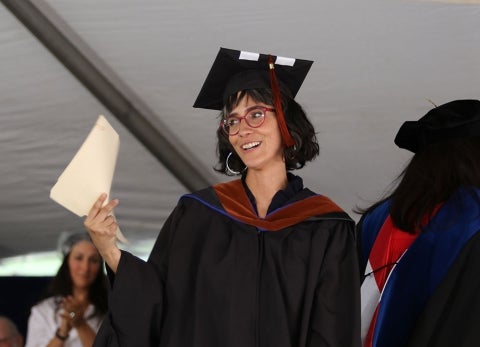 Brunilda Pizarro ’18 M.E.Sc.: “We have a moral obligation to do more.”
Brunilda Pizarro ’18 M.E.Sc.: “We have a moral obligation to do more.”
Class speaker Brunilda Pizarro ’18 M.E.Sc. reminded her classmates that issues of injustice experienced by Black, brown and indigenous people are often connected to conditions they experience in the environment. In her remarks, she applauded her classmates who have spoken up for marginalized voices and challenged the School to recognize its own shortcomings in addressing inequality in the environmental movement — and in the city of New Haven itself.
“How can we claim to be experts and engage with environmental issues abroad if we have not been able to confront the stark racial and socioeconomic realities in our own backyard?” she said. “We have a moral obligation to do more. These issues are neither ahistorical, apolitical, neutral, nor objective. This world is much more complicated than a set of figures. We need to humanize these lived experiences and the social sciences in partnership with other paradigms can provide an opportunity to elucidate humanity.”
She thanked those classmates whose advocacy prompted important discussions within the School community on the impacts of deeply rooted environmental injustice, as well as those faculty and staff members who have been receptive to these difficult discussions. These discussions, she said, has brought hope of “transformative change.”
“The students who have engaged in this process operated from a premise of love,” she said. “As a result, I hope that F&ES continues to be a premier environmental school, one that is inclusive of varying perspectives and, beyond scholarship, stands boldly as a school that is intolerant of racism and is led by its moral compass,” she said. “After all, excellence begins with our own internal transformation.”
“How can we claim to be experts and engage with environmental issues abroad if we have not been able to confront the stark racial and socioeconomic realities in our own backyard?” she said. “We have a moral obligation to do more. These issues are neither ahistorical, apolitical, neutral, nor objective. This world is much more complicated than a set of figures. We need to humanize these lived experiences and the social sciences in partnership with other paradigms can provide an opportunity to elucidate humanity.”
She thanked those classmates whose advocacy prompted important discussions within the School community on the impacts of deeply rooted environmental injustice, as well as those faculty and staff members who have been receptive to these difficult discussions. These discussions, she said, has brought hope of “transformative change.”
“The students who have engaged in this process operated from a premise of love,” she said. “As a result, I hope that F&ES continues to be a premier environmental school, one that is inclusive of varying perspectives and, beyond scholarship, stands boldly as a school that is intolerant of racism and is led by its moral compass,” she said. “After all, excellence begins with our own internal transformation.”
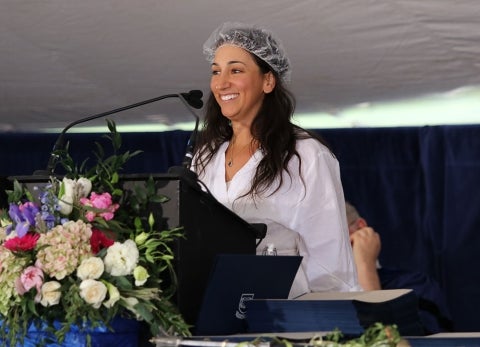 Emily Sigman ’19 M.F./M.A.: “The Universe asked me in that moment, ‘Is this where you would go if you knew it would be the last place you ever went?’ And I said yes.”
Emily Sigman ’19 M.F./M.A.: “The Universe asked me in that moment, ‘Is this where you would go if you knew it would be the last place you ever went?’ And I said yes.”
Emily Sigman ’19 M.F./M.A. — who, like Pizarro, was chosen by her classmates to be class speaker — playfully blew bubbles as she noted that being part of the Yale community is not unlike being in a “bubble,” apart from the rest of society. But her decision to attend F&ES was not one she took lightly. Sigman explained that she received her Yale acceptance letter just days after her third round of cancer treatments.
“The Universe asked me in that moment, ‘Is this where you would go if you knew it would be the last place you ever went?’ And I said yes. Something in me knew that this was the bubble for me. I came to F&ES full of optimism…and grace — like a mirror — reflected my hopes, aspirations, and predilections for thin-crust pizza squarely back at me.
“FES, in this bubble, you sang me songs about plants, and rode bikes with me to the beach, and shared food with me at your potluck dinners,” she said.
“You helped me find shelter beneath the shrapnel and falling debris of what used to at least masquerade as a functioning political system. You kept me awake to the persistent injustices of a world that still insists on systemic oppression, even and especially within our own walls. You planted seeds with me. You helped me grow a garden in a courtyard. You helped me tend a forest in my soul.”
“The Universe asked me in that moment, ‘Is this where you would go if you knew it would be the last place you ever went?’ And I said yes. Something in me knew that this was the bubble for me. I came to F&ES full of optimism…and grace — like a mirror — reflected my hopes, aspirations, and predilections for thin-crust pizza squarely back at me.
“FES, in this bubble, you sang me songs about plants, and rode bikes with me to the beach, and shared food with me at your potluck dinners,” she said.
“You helped me find shelter beneath the shrapnel and falling debris of what used to at least masquerade as a functioning political system. You kept me awake to the persistent injustices of a world that still insists on systemic oppression, even and especially within our own walls. You planted seeds with me. You helped me grow a garden in a courtyard. You helped me tend a forest in my soul.”
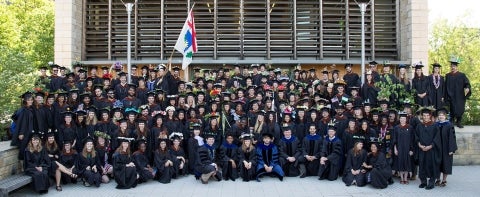
– Kevin Dennehy kevin.dennehy@yale.edu 203 436-4842
Published
May 22, 2018